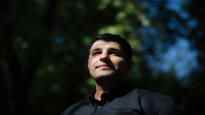The city war left Bazia Prudens with deep scars. He wants to talk about his experiences so that young Finns don’t go to fight in Ukraine.
Lights and shadows mix in Finnish Kurdish Bazia’s Prudens34, in Memoirs of Kirkuk, Northern Iraq.
On the other hand, Prudens remembers the good humor of the people in the city, the attitude with which they strive to move forward in life and the smell of a familiar kebab place.
Then there’s the other side. Years of urban warfare. Explosions and roadside bombs along the school road.
– This was the world I grew up in, says Prudens.
Prudens’ family returned to the Kurdish region of northern Iraq in 2001. Before that, the family had lived in Finland for 10 years.
A couple of years later, the war started.
Prudens became an interpreter for the US Armed Forces in 2007. He was a 19-year-old high school student at the time. The young man wanted to help his country and fight for democracy and a freer world. Now Prudens chuckles as she thinks of herself at that time.
– I thought I was really grown up. Now when I see someone 19 years old, I think they are a child!
Traumas have followed Prudens until these days.
– I have woken up countless times at night in a panic to look for my gun, Prudens describes his nightmares.
Russia’s war of aggression against Ukraine brought the memories close again.
For this reason, he feels it is his duty to publish his experiences, when many Finns have left or said they are considering going to fight in Ukraine.
The battle for roads and population centers
Urban war has already shown its brutal face in Ukraine. In particular, the news from the port city of Mariupol highlighted the suffering of civilians at the foot of the war.
In the early spring, the Russian attack resembled the US attack on Iraq in 2003, according to the assistant professor of the National Defense University’s Department of Military Art, major Antti Paronen.
In both wars, the attacker advanced, for example, over long distances in the terrain. However, the situation in Ukraine changed during April and when May came. In particular, the change can be seen in the current battles in eastern Ukraine.
– There is a return to the Russian idea of warfare of destruction, that you must first destroy with fire before you can occupy the area with infantry and armored infantry, Paronen explains the change.
In Iraq, the war focused on fighting for roads and population centers. The role of settlement centers was emphasized especially after the end of the attack phase, says Paronen.
– After the occupation of Iraq, the fighting took place in population centers between the United States and the Western coalition, as well as informal armed forces.
In Ramadi, the bases of the US forces, the combat outposts, were located inside the city. The violence directed by the enemy was constantly present, Prudens says.
The time in Ramadi was turning point for Prudens in many ways. Prudens received combat training in the city in the US Special Forces. In Kirkuk, Prudens had only carried a notebook and a pen. In Ramadi, a knife and a gun were soon included.
– I knew that Ramadi was significantly more dangerous and bloodier, but at that point I was so immersed in the world of war that it didn’t really bother me, Prudens says.
Exhaustion brought back memories
Bazian Prudens returned to Finland in 2010. He wanted to forget the war and push the related thoughts and memories aside.
– When I came back, it was not obvious that I had been in the war.
Prudens studied to become a nurse and focused on the rest of her life. However, the events of the war constantly affected life. It showed up, for example, as impulsive behavior. Anger, aggression and deep sadness overshadowed life, Prudens says.
Pushed aside memories returned when Prudens was diagnosed with burnout from her work as a nurse in 2019.
– Everything that had happened in the war came back to life.
Prudens struggled with suicidal thoughts. He was diagnosed with, among other things, depression and post-traumatic stress disorder. Prudens felt that there was nothing more worth experiencing in life.
Everything that had happened in the war came back to life.
Bazia’s Prudens
However, the thoughts slowly began to end when Prudens continued to grab by James Allen to As a Man Thinketh, a book about the power of thought published in 1903. The small book gave hope.
– I realized that I can influence my own subconscious and decide in which direction I want the flow of life to take me.
For Prudens, work burnout acted as an impetus towards something new. Nowadays, he works as a team coach in a company that strives to enhance teamwork so that the teams are doing well at the same time.
Although Prudens has learned to utilize wartime lessons such as strategic thinking in his current work, he wouldn’t wish his fate on anyone.
Instead, he hopes that those considering going to Ukraine would stop and think about their motives. The reason why leaving seems attractive.
– Could meaning be found in something else? I believe we can all improve the world in our own way. And it doesn’t have to be anything big, says Prudens.
